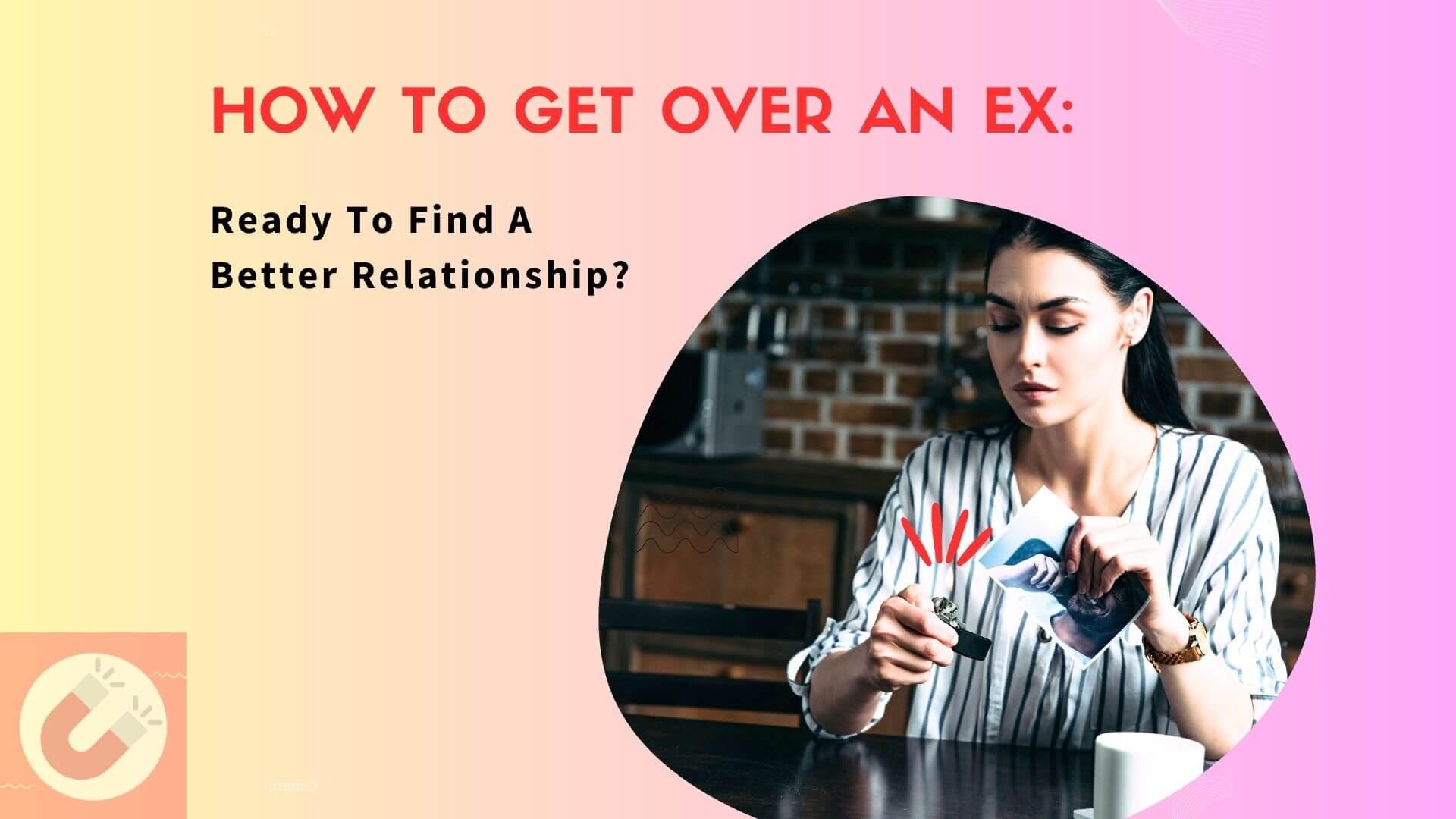Breaking up with someone can leave you feeling lost, confused, heartbroken, and unsure of how to start flirting with new people and move forward. It’s important to remember that it happens to everyone, and you can and will get through this.
Getting over an ex can be a difficult and painful process. But don’t despair!
Whether you were the one who initiated the breakup or not, we all need to take some time to process our emotions and come to terms with the end of a relationship before deciding to swear off dating forever or jumping into a rebound relationship.
Instead of rushing into a new relationship right away or dwelling on painful memories, use this time to become more outcome independent and acquire new tools for personal growth.
In this article, we’ll explore some of the most common breakup advice and relationship questions that we get at Jaunty, and offer some expert tips and strategies to help you get over your ex and move on with your life.
By the end of this article, you’ll have a better understanding of how to navigate the difficult emotions that come with a breakup and be on your way to a happier, healthier future.
Is having feelings for an Ex normal?
Yes, having feelings for an ex after a breakup is completely normal.
It’s natural to feel a range of emotions, including sadness, longing, or even anger, as you process the end of the relationship. These feelings are a part of the healing process and can help you come to terms with the breakup and eventually move on.
Breaking up with someone can be one of the most difficult experiences in life. It’s important to remember that healing takes time, and there is no set timeline for moving on from a relationship. Take your time, especially if you’re starting to date after a divorce or getting out of a long term relationship. Be patient with yourself and allow yourself to feel these emotions without judgment.
Over time, as you focus on self-care, personal growth, and building a strong support network, these feelings will likely diminish, and you’ll be able to move forward with your life.
How can I stop thinking about my ex?
When people break up with their romantic partners, it can make them question who they are without that person, and constantly thinking about an ex will make it that much harder for you to figure out who you are without them.

“Hearts will never be practical until they are made unbreakable.”
— The Tin Man, The Wizard of Oz
This study looked at how people’s thoughts about themselves and their feelings changed after a breakup. The researchers found that when people self-reported that they were having a hard time figuring out who they were without their partner, they also felt worse emotionally.
When researchers observed how these participants reacted to the thought of an ex-partner, they found that people’s facial muscles showed signs of negative emotions.
Through measuring the outcomes of both self-reporting (what people said about themselves) and psychophysiological data (how their bodies reacted), the study showed that it’s important for people to rebuild their sense of self after a breakup to feel better.
Stopping yourself from thinking about your ex can be challenging, but there are several strategies you can try to help shift your focus and move on.
Here are some tips to help you stop thinking about your ex:
- Limit reminders: Remove or avoid things that remind you of your ex, such as photos, gifts, or places you used to visit together. This can help reduce the frequency of thoughts about your ex.
- Stay busy: Engage in activities that keep your mind occupied, such as hobbies, exercise, or spending time with friends and family. Staying busy can help distract you from thoughts of your ex.
- Focus on self-improvement: Use this time to work on personal growth and self-improvement. Setting new goals and working towards them can help shift your focus away from your ex and toward your own well-being.
- Practice mindfulness: When thoughts of your ex arise, acknowledge them without judgment and then gently redirect your focus to the present moment. Mindfulness techniques, such as meditation or deep breathing, can help you manage intrusive thoughts and stay grounded in the present.
- Seek support: Talk to friends, family, or a therapist about your feelings and thoughts. Sharing your experiences with others can help you process your emotions and gain new perspectives on the situation.
Remember that healing takes time, and it’s normal for thoughts of your ex to linger for a while. Be patient with yourself and continue to practice these strategies to gradually reduce the frequency of thoughts about your ex and move forward with your life.
How can I cope with the pain of a breakup?
One of the most important things you can do after a breakup is to take care of yourself. This means giving yourself time to grieve and process your emotions. It’s okay to feel sad, angry, or confused after a breakup. Allow yourself to feel these emotions and don’t try to push them away.
Surround yourself with a support system of friends and family who can help you through this difficult time. Reach out to people you trust and let them know what you’re going through. They can provide a listening ear, a shoulder to cry on, or even just a distraction from your pain.
If you don’t have that support system, consider joining a support group or seeking professional help from a therapist or counselor. Jaunty’s online social skills classes can provide guidance and coping strategies to help you navigate the emotional turmoil of a breakup.
What are some effective ways to move on after a breakup?
There are several strategies you can employ to help you move on after a breakup. Some of these include focusing on self-improvement, setting new goals, and creating new routines. It’s also important to cut off contact with your ex, at least for a while, to give yourself the space and time you need to heal.
Practicing mindfulness is one of the most effective strategies to focus on the present moment and not dwell on the past. This means letting go of any regrets or what-ifs and focusing on what you can control in the present. It’s also important to practice self-care and engage in activities that bring you joy and fulfillment.
Focus on the present
Mindfulness, which is all about being fully aware and present in the moment, can be a big help when dealing with a breakup and getting ready for a new relationship. Research has shown that practicing mindfulness can actually change the way your brain works. It can help you pay more attention to what’s going on in your mind and how you’re feeling, which is really important for managing emotions and understanding other people’s feelings.
One big benefit of mindfulness is that it can help you notice habits or behaviors you might not have realized you had. These could be things that got in the way of your past relationships.
Mindfulness can also help you control your emotions better and handle stress more effectively. These skills can be a big help when dealing with the highs and lows of relationships. It can allow you to think more clearly and react more calmly, which can keep you from repeating mistakes from past relationships.
Remember that healing takes time and there is no set timeline for moving on. Be patient with yourself and trust that with time and effort, you will be able to move on and find happiness again.
How can I rebuild my confidence after a breakup?
A breakup can leave you feeling insecure and doubting yourself. One way to rebuild your confidence is to focus on your strengths and accomplishments. Make a list of your positive qualities and remind yourself of them regularly. Practice self-care and engage in activities that make you feel good about yourself. This can include exercise, hobbies, or spending time with friends and family.
Another effective strategy is to set new goals for yourself and work towards achieving them. This can help you regain a sense of purpose and accomplishment, which can boost your confidence and self-esteem.
How can I rebuild my self-esteem and avoid falling into the same patterns in future relationships?
Take some time to reflect on the relationship and what you learned from it. Consider what worked well and what didn’t, and think about what you want in a future relationship. Be honest with yourself about any patterns or behaviors that may have contributed to the breakup.
This can be a difficult process, but it’s an important step in avoiding the same mistakes in future relationships. Consider seeking the help of a therapist or counselor to work through any underlying issues or patterns that may be impacting your relationships.
You could also consider working with a social skills coach that draws from a variety of fields, including philosophy, psychology, neuroscience, and the behavioral sciences, to teach people the communication and social intelligence skills they need to thrive in their personal and professional lives.
How To Get Over An Ex In Seven Steps
Getting over an ex can be a challenging and emotional journey, but with the right mindset and approach, you can successfully move on and create a happier, healthier future for yourself. Here are seven steps to help you get over your ex and move on for good:
1. Accept the reality of the breakup
The first step in moving on is accepting that the relationship has ended. This may be difficult, but it’s important to face the reality of the situation and not hold onto false hope or denial. Accepting the breakup allows you to start the healing process and move forward with your life.
2. Give yourself time to grieve
It’s normal to feel a range of emotions after a breakup, including sadness, anger, and confusion. Allow yourself to feel these emotions and give yourself the time and space you need to grieve the end of the relationship. Remember that healing takes time, and it’s okay to feel sad or upset as you process your emotions.
3. Cut off contact with your ex
In order to move on, it’s important to create some distance between you and your ex. This means cutting off contact, at least for a while, to give yourself the space and time you need to heal.
This can include:
- Deleting their number
- Unfollowing them on social media
- Ignoring their calls or any offers to meet up with them
- Intentionally avoiding places where you might run into them
- Not talking to friends about them or attending mutual events
- Resisting any urge to ask questions or try to keep tabs on them
- Blocking their email or setting up filters to avoid intrusive messages
4. Focus on self-improvement
Use this time to focus on yourself and your personal growth. Engage in social activities that make you feel good about yourself, such as exercise, hobbies, or spending time with friends and family. Set new goals for yourself and work towards achieving them. This will help you regain a sense of purpose and accomplishment, which can boost your confidence and self-esteem.
5. Reflect on the relationship and learn from it
Take some time to reflect on the relationship and what you learned from it. Consider what worked well and what didn’t, and think about what you want in a future relationship. Be honest with yourself about any patterns or behaviors that may have contributed to the breakup and work on addressing these issues to avoid repeating them in future relationships.
Some tips include:
- Journaling: Write down your thoughts and feelings about the relationship. This can help you process your emotions and better understand what happened. It can also help you identify patterns and behaviors that you might want to change.
- Seek feedback: If you’re comfortable doing so, you might seek feedback from friends or family members who know about your relationship. They can provide a different perspective and help you see things you might have missed.
- Self-awareness: Be mindful of your reactions and emotions during the relationship. Were there times you reacted in ways you weren’t proud of? Were you acting manipulatively or needy? Or were there red flags that you ignored? Acknowledging the truth about the relationship can help you grow and change for the better.
- Recognize your strengths: While it’s important to acknowledge your mistakes and areas for improvement, it’s equally important to recognize what you did well. Did you show empathy, patience, or great communication? These are strengths you can bring to your next relationship.
- Focus on personal growth: Use the time post-breakup to focus on personal growth and self-improvement. This could include learning new skills, pursuing hobbies, or improving your physical and mental health.
- Professional Help: Consider speaking to a therapist or a counselor. They can provide a safe space for you to express your feelings and offer professional advice to help you navigate through this difficult time.
- Set healthy boundaries: Reflect on the boundaries in your past relationship. Were they respected? Did you communicate with them clearly? This reflection can help you understand how to be more assertive when it comes to setting healthy boundaries in future relationships.
- Define what you want in a relationship: Consider what you’re looking for in a partner and a relationship. This can help guide your decisions and actions in future relationships.
6. Surround yourself with a support system
Reach out to friends and family who can provide emotional support and encouragement during this difficult time. If you don’t have a strong support system, consider joining a support group or seeking professional help from a therapist or counselor. They can provide guidance and coping strategies to help you navigate the emotional turmoil of a breakup.
7. Be patient and trust the process
Remember that healing takes time and there is no set timeline for moving on. Be patient with yourself and trust that with time and effort, you will be able to move on and find happiness again. Stay focused on your personal growth and self-improvement, and eventually, you will emerge stronger and more resilient from this experience.
Should I tell my friends about my breakup?
Yes, it’s generally a good idea to tell your friends about your breakup. Sharing your feelings and experiences with trusted friends can provide emotional support and help you process the end of the relationship. Your friends can offer a listening ear, a shoulder to cry on, or even just a distraction from your pain. It’s important to have a support system in place during this difficult time, and your friends can play a crucial role in helping you heal and move forward.
How do I know if I’m ready to start dating again after a breakup?
Knowing when you’re ready to start dating again after a breakup can be challenging, but there are some signs and factors to consider that can help you determine if you’re truly ready.
- Emotional healing: You’ve allowed yourself time to grieve the end of the relationship and have processed your emotions. You no longer feel overwhelmed by sadness, anger, or resentment towards your ex.
- Acceptance: You’ve accepted the reality of the breakup and have let go of any lingering hopes of flirty signals, reconciliation, or lingering feelings for your ex.
- Personal growth: You’ve taken the time to reflect on the relationship, learn from it, and work on any personal issues or patterns that may have contributed to the breakup.
- Independence: You feel comfortable and content with your own life, and you’re not seeking a new relationship solely to fill a void or avoid loneliness.
- Openness: You’re open to the idea of meeting new people and forming new connections, and you’re willing to invest time and effort into building a new relationship.
How can I trust someone again after a breakup?
Regaining trust in others after a breakup can be challenging, especially if the relationship ended due to betrayal or dishonesty. However, it’s important to remember that not everyone will behave in the same way as your ex, and it’s possible to rebuild trust and form healthy relationships moving forward. Take things slow and focus on making new friends at first. Here are some tips to help you trust someone again after a breakup:
- Take your time: Allow yourself time to heal from the breakup and process your emotions before jumping into a new relationship. This will help you be more approachable and open to new connections with a clearer mind and a more open heart.
- Reflect on the past: Analyze the factors that contributed to the trust issues in your previous relationship. Understanding these factors can help you identify potential relationship red flags and avoid repeating the same patterns in future relationships.
- Set boundaries: Establish clear boundaries and expectations in your new relationship. Communicate openly with your partner about your needs and concerns, and ensure that both parties are committed to respecting and maintaining these boundaries.
- Reframe your thoughts: Remind yourself that not everyone will behave like your ex, and try to avoid projecting past experiences onto new relationships. Focus on the positive qualities of your new partner and give them the opportunity to earn your trust.
- Build trust gradually: Trust is built over time through consistent actions and open communication. Allow your new relationship to develop at a comfortable pace, and give yourself and your partner the opportunity to demonstrate trustworthiness through your actions.
- Seek professional help: If you’re struggling to trust others after a breakup, consider seeking the help of a therapist or counselor. They can provide guidance and coping strategies to help you work through trust issues and build healthier relationships in the future.
Remember that rebuilding trust takes time and effort, and it’s important to be patient with yourself and your new partner as you navigate this process together.
How can I be happy being single after a breakup?
Being happy while single after a breakup is possible and can be an opportunity for personal growth and self-discovery. Here are some tips to help you embrace and enjoy your single life after a breakup:
- Focus on self-care: Prioritize your physical, emotional, and mental well-being. Engage in activities that make you feel good, such as exercise, hobbies, or spending time with friends and family.
- Embrace personal growth: Use this time to work on self-improvement and personal development. Set new goals for yourself and work towards achieving them, whether they’re related to your career, health, or personal interests.
- Build a strong support network: Surround yourself with friends and family who can provide emotional support and encouragement during this time. Foster meaningful connections with others and engage in social activities that bring you joy.
- Rediscover your interests: Revisit hobbies or activities that you may have neglected during your relationship. Explore new interests and passions to keep your mind engaged and focused on your own happiness.
- Practice gratitude: Focus on the positive aspects of your life and practice gratitude for the things you have. This can help shift your mindset and promote a sense of contentment and happiness in your single life.
- Give yourself time: Remember that healing from a breakup takes time, and it’s okay to feel a range of emotions during this process. Be patient with yourself and trust that you will eventually find happiness and fulfillment in your single life.
By focusing on self-care, personal growth, and building a strong support network, you can cultivate happiness and contentment in your single life after a breakup.
It’s Time To Embrace Your Life and Leave the Past Behind
Getting over an ex and moving on with your life is challenging but necessary. It’s important to remember that everyone’s journey to healing and readiness for a new relationship is different. Be patient with yourself and trust your instincts. If you feel that you’re not quite ready to start dating again, give yourself more time to heal and focus on your personal growth.
Allow yourself to grieve, seek support, and focus on self-improvement and self-care. By doing so, you’ll be better equipped to navigate the difficult emotions that come with a breakup and be on your way to a happier, healthier future.
To Overcome a Breakup and Move Forward
- Give yourself time to grieve and process your emotions
- Surround yourself with a support system of friends and family
- Focus on self-improvement, setting new goals, and creating new routines
- Cut off contact with your ex to give yourself space to heal
- Focus on the present moment and practice self-care
- Rebuild your confidence by focusing on your strengths and accomplishments
- Reflect on the relationship and learn from it to avoid repeating patterns in future relationships
Remember that healing takes time, and there is no set timeline for moving on. Be patient with yourself and trust that with time and effort, you will be able to move on and find happiness again. Embrace your new life and leave the past behind, knowing that you are stronger and wiser for having gone through this experience.
Focus On Self-Care, Personal Growth, And Building Your Support Network
Focusing on self-care, personal growth, and building a strong support network can make a significant difference in your overall well-being and happiness.
At Jaunty, we understand the importance of these aspects in overcoming social set backs, challenging preconceived notions, and thriving in your social life.
Connect with people and join thousands like you who have exercised their social skills with the world’s best social instructors, you can gain valuable insights and tools to help you navigate the complexities of relationships and personal growth.
Partnering with a social skills coach can provide you with personalized guidance and support in various areas, including:
- Developing effective communication strategies
- Building and maintaining strong, supportive relationships
- Enhancing your self-confidence and self-esteem
- Identifying and addressing personal patterns that may impact your relationships
- Setting and achieving personal and professional goals
- Practicing mindfulness and self-care techniques to promote emotional well-being
Don’t let a breakup hold you back from achieving your personal growth goals. Embrace the opportunity to learn, grow, and thrive with the support of Jaunty’s expert social skills coaches.
4538



